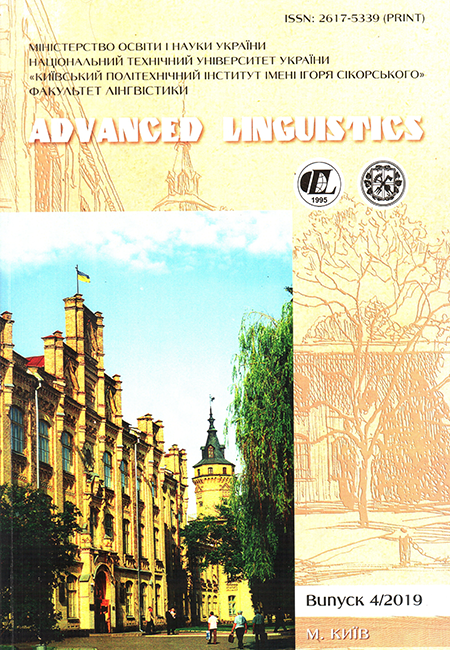QUESTION OF THE RELATION BETWEEN COGNITIVE AND CONOTATE COMPONENTS IN PHRASEOLOGICAL MEANING
DOI:
https://doi.org/10.20535/2617-5339.2019.4.186051Ключові слова:
idiom, phraseological meaning, semantic meaning, meaning’s structure, denotate, significate, connotate, cognitive componentАнотація
The article presents the results of the study of phraseological meaning, in particular the relation between cognitive (denotative-significative) and connotative components, as well as the completeness of the latter. The suitability of distinguishing a special, distinct from the lexical, meaning in idioms, which has long been one of the central problems of linguistic studies, tells them from words, variables phrases and sentences. Based on the achievements of modern linguistics, which postulate the “block organization” of semantics of linguistic units, the author combines denotation and phraseological meaning in one macrocomponent – cognitive, or denotative-significative, which will cover the formal and semantic parts of the meaning. Concerning the connotative component, in the semantics of idioms, it merges with the subject-logical information, since the process of nomination and perception of the reality with these units has an emotional and intellectual nature. In the structure of the connotative component of idioms, the author distinguishes between four interrelated and mutually dependent components: emotional, expressive, appraisal, and cultural. Due to this structure, the idioms appear as polylexical nominative-characterizing signs, the internal form of which retains the collective experience of sensory perception of objects of reality with varying degrees of expressiveness, a system of ideological positions, aesthetic assessments, norms of speech and extra-language behavior of a language team.
Посилання
Alefirenko, M. F. (1987). Teoretychni pytannya frazeologiyi [Theoretical issues of phraseology]. Kharkiv: Vyshha shk. [in Ukranian]
Artemova, A. F. (2002). Kul'turno-nacional'naya specifika anglijskih frazeologicheskih edinic i ee sohranenie pri perevode [Cultural and national specificity of English phraseological units and its preservation in translation]. Universitetskie chteniya – University readings. Pyatigorsk: Pyatigor. gos. lingv. un-t, 79–80. [in Russian]
Gladka, V. (2018). Neofrazeologіzacіya suchasnoї francuz'koї movi: lіngvokognіtivnij aspekt [Neo-phraseologization of modern French language: linguocognitive aspect]. (Vol. 1). Chernіvcі: Tekhnodruk. [in Ukranian]
Dems'kij, M. (1992). Sut' frazemi, її onomasіologіchnі funkcії ta osoblivostі nomіnacії [The essence of phrases, its onomasiological functions and features of the nomination]. Zapiski naukovogo tovaristva іm. T. SHevchenka – Notes by the Scientific Society T. Shevchenko, 224, 240–269. [in Ukranian]
Dubickaya, E. V. (2011). Problemy motivacii znachenij idiom russkogo yazyka [Problems of motivation of the idioms’ meaning of the Russian language]. Extended abstract of candidate’s thesis. Moskva. [in Russian]
Kovshova, M. L. (2012). Lingvokul'turologicheskij metod vo frazeologii: Kody kul'tury [Linguocultural method in phraseology: Codes of culture]. Moskva: Knizhnyj dom “LIBRIKOM”. [in Russian]
Levickij, V. V. (1989). Statisticheskoe izuchenie leksicheskoj semantiki [Statistical study of lexical semantics]. Kiev: UMK VO. [in Russian].
Teliya, V. N. (1996). Russkaya frazeologiya. Semanticheskij, pragmaticheskij i lingvokul'turologicheskij aspekty [Russian phraseology. Semantic, pragmatic and linguocultural aspects]. Moskva: SHkola “YAzyki russkoj kul'tury”. [in Russian]
Teplyakov, І. (2005). Frazeologіchna semantika (na materіalі deyakih slovʼyans'kih mov) [Phraseological semantics (on the material of some Slavic languages). Problemi slovʼyanoznavstva – Problems of Slavic Studies, 55, 156–163. [in Ukranian]
Ufimceva, A. A. (1986). Leksicheskoe znachenie [Lexical meaning]. Moskva: Nauka. [in Russian]
Frumkina, R. M. (2006). Psiholingvistika [Psycholinguistics]. Moskva: Akademiya. [in Russian]
CHernaya, A. I. (1988). Vyyavlenie sintagmaticheskih i paradigmaticheskih otnoshenij na frazeologicheskom urovne [Identification of syntagmatic and paradigmatic relations at the phraseological level]. Filologicheskie nauki – Philological sciences, 4, 61–67. [in Russian]
Shapoval, O. V. (2003). Komunіkativno-stil'ovі parametri vtorinnoї nomіnacії v gazetno-zhurnal'nіj publіcisticі 80–90-h rokіv XX stolіttya [Communicative-style parameters of the secondary nomination in the journals of the 80–90’s of the XXth century]. Extended abstract of candidate’s thesis. Dnіpropetrovs'k. [in Ukranian]
Bally, Ch. (1951). Traité de stylistique française. En 2 vol. Vol. I. Genève: Librairie de l’Université Georg & Cie S.A.
##submission.downloads##
Опубліковано
Номер
Розділ
Ліцензія
Наше видання використовує положення про авторські права CREATIVE COMMONS для журналів відкритого доступу.
Автори, які публікуються у цьому журналі, погоджуються з наступними умовами:
1. Автори залишають за собою право на авторство своєї роботи та передають журналу право першої публікації цієї роботи на умовах ліцензії Creative Commons Attribution License, котра дозволяє іншим особам вільно розповсюджувати опубліковану роботу з обов'язковим посиланням на авторів оригінальної роботи та першу публікацію роботи у цьому журналі.
2. Автори мають право укладати самостійні додаткові угоди щодо неексклюзивного розповсюдження роботи у тому вигляді, в якому вона була опублікована цим журналом (наприклад, розміщувати роботу в електронному сховищі установи або публікувати у складі монографії), за умови збереження посилання на першу публікацію роботи у цьому журналі.

